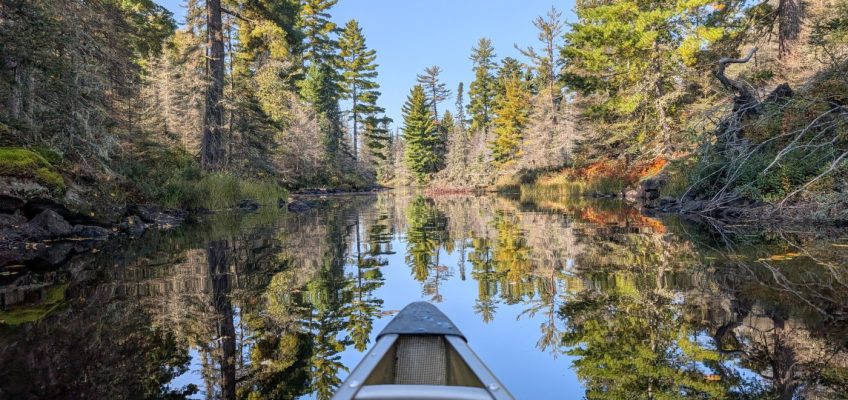DULUTH — U.S. Rep. Pete Stauber said he supports a bill introduced in the U.S. Senate that would allow federal immigration enforcement officials to use motorized vehicles and build roads, surveillance equipment, fences and structures in federally designated wilderness within 100 miles of the U.S. border, including the Boundary Waters Canoe Area Wilderness.
The Republican from Hermantown, whose district includes the BWCAW, did not answer a question on whether he would introduce a companion bill in the House of Representatives.
But in a statement to the News Tribune, Stauber said on his trip to the U.S.-Mexico border in Arizona in 2024, he “saw America’s federal lands suffer from environmental damage due to left-behind trash, human waste, illegal trails, and abandoned campfires.”
“(This) bill will give the Department of Homeland Security the power to protect our most precious spaces, like the Boundary Waters, from similar destruction,” Stauber said. “This could become especially relevant to Minnesota because with our southern border completely closed, our northern border could become the next target for illegal immigration into the U.S.”
The Minnesota Star Tribune first reported Stauber’s support of the bill.
With few exceptions, the Wilderness Act of 1964 bans motorized vehicles, chainsaws, roads and other activities and infrastructure that would ruin federally designated wilderness, which it defines, in part, as “undeveloped Federal land retaining its primeval character and influence, without permanent improvements or human habitation, which is protected and managed so as to preserve its natural conditions.”
In addition to the 1.1 million-acre BWCAW, Northland wilderness areas within 100 miles of the border include parts of Isle Royale National Park and Apostle Islands National Lakeshore. More than 99% of Isle Royale is federal wilderness, and 80% of the Apostle Islands are covered by the Gaylord Nelson Wilderness.
Related Articles
Nature walks are good for you, but can a city stroll be just as good?
Skywatch: Long starry nights are back
Hunting camp tradition is a rite of fall at its finest
Hamline University, Manitou Fund send St. Paul teachers into the woods to write lesson plans
Scandia moving ahead on Gateway Trail extension over objections
Although the BWCAW is not a conduit for undocumented immigrants or drugs illegally entering the U.S., the Department of Homeland Security agencies, like the U.S. Border Patrol, have long monitored the BWCAW and its border with Canada.
Agents typically patrol by foot, canoe or aircraft, and while a 2013 report by the environmental group Wilderness Watch said low-flying helicopters, presumably flown by border enforcement, were ruining the wilderness experience of BWCAW campers, the agents’ actions have generally not disrupted visitors.
However, the new Senate bill , introduced by Sen. Mike Lee, R-Utah, earlier this month, would substantially increase what border agents could do in wilderness areas.
The bill calls for the Departments of Interior and Agriculture to allow Homeland Security greater access to wilderness areas so it can take actions to deter illegal immigration like adding “tactical infrastructure” which it defines as “infrastructure for the detection of illegal southern border and northern border crossings, including observation points, remote video surveillance systems, motion sensors, vehicle barriers, fences, roads, bridges, drainage and detection devices.”
Kevin Proescholdt, conservation director for Wilderness Watch, said Lee’s bill, if passed, could damage the BWCAW “almost beyond recognition.”
“Lee’s bill could overturn more than a century of conservation work to protect the wild character of the Boundary Waters Wilderness by landing aircraft and deploying remote video surveillance systems and motion sensors throughout this Wilderness,” Proescholdt said in a news release. “You only have to look at the devastation DHS has wreaked on wildlands on the southern border to appreciate the devastating impacts Senator Lee’s bill could have on the Boundary Waters Wilderness.”
Wilderness Watch said the language in the bill appears to also open the door to logging and other related activities aimed at “fuels management.”
Minnesota’s Democratic senators — Tina Smith and Amy Klobuchar — both oppose the bill.
Smith described the BWCAW as “one of this country’s great natural treasures” and vowed to fight any legislation that threatened it.
“Americans want to see our public lands protected, but Senator Lee’s bill overwrites important protections in the original Wilderness Act and could result in serious harm to our wild places, including the Boundary Waters,” Smith said in a statement to the News Tribune.
In a separate statement, Klobuchar said, “I oppose Senator Lee’s bill, which would allow harmful development in federal wilderness areas, while also requiring the government to waste resources that could be put to better use elsewhere.”
Related Articles
Native-led nonprofit Dakota Wicohan named Greater Minnesota Bush Prize honoree
Better parks? Safer streets? Greener neighborhoods? Students asked to enter “Mayor For a Day” essay contest
Government shutdown may delay home heating aid
Hunting camp tradition is a rite of fall at its finest
BCA: DWI breath test results accurate after 200+ previously suspected invalid


Leave a Reply